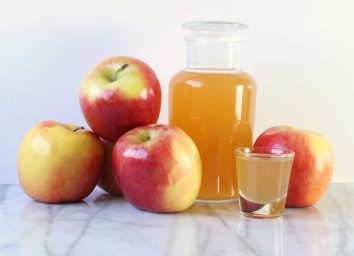6 Effects of Drinking Prune Juice, Says Dietitian
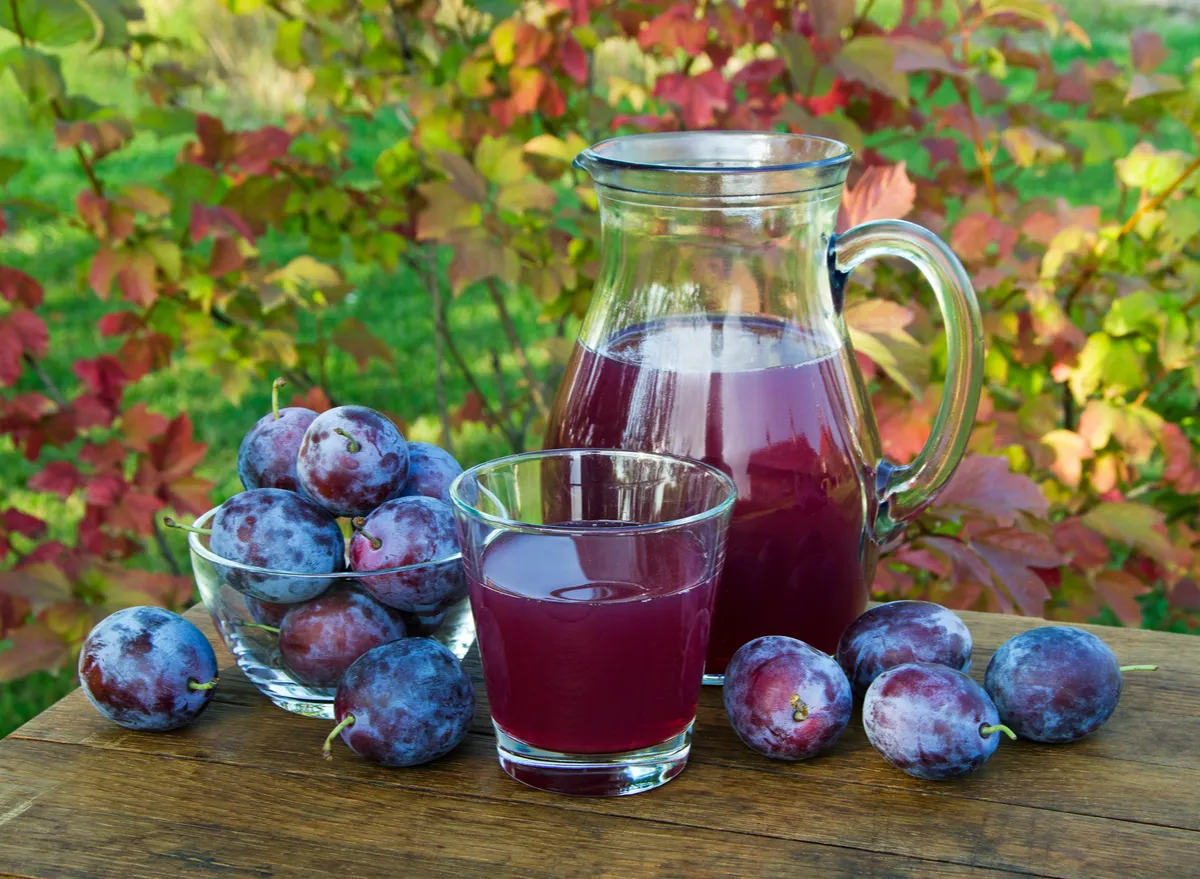
Prune juice is a beloved staple when constipation strikes, thanks to the naturally occurring sorbitol (a type of sugar) found in these fruits. But leaning on naturally sweet juice can do so much more for your health than just help you go number two when your body needs a little more support in that department.
According to the Center for Disease Control and Prevention, roughly 90% of Americans are not meeting their fruit and vegetable needs, leaving a large group of people vulnerable to experiencing potential nutrition gaps. And since the Dietary Guidelines for Americans recognizes that 100% fruit juice, like prune juice, provides key nutrients and hydration, including prune juice in a healthy diet can help people meet their fruit quota as long as at least half of the recommended amount of fruit still comes from whole fruit instead of juice options.
Prune juice isn't just an easy way to sneak some fruit into your diet. This beverage popular amongst pregnant moms, elderly adults, and other groups that need a little extra help in the bathroom department, is chock-full of key nutrients that support our overall health.
Specifically, one 8-ounce serving of Sunsweet Amaz!n Prune Juice contains:
- 4 grams of fiber
- 0 grams of fat
- 8% DV magnesium
- 10% DV potassium
- 2% DV of iron
So, if you are a fan of prune juice and you choose to drink it frequently, here are some side effects you can expect to experience. Read on, and for more, don't miss The #1 Best Juice to Drink for a Long Life, Says Dietitian.
You may have regular bowel movements.
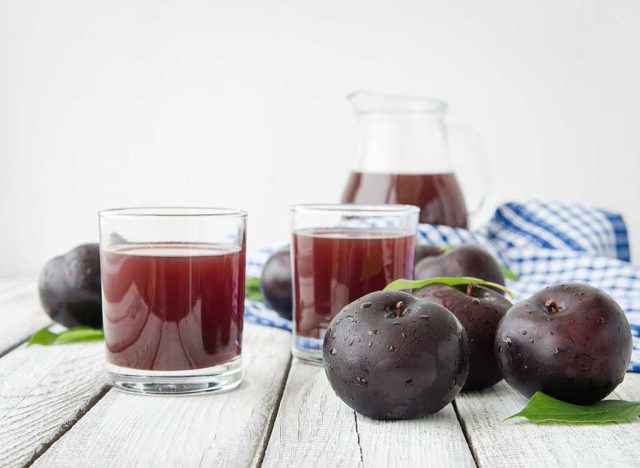
Unlike prunes, prune juice can be devoid of fiber due to filtration before bottling, depending on the brand you choose. But the lack of fiber shouldn't stop you from looking to prune juice as a constipation solution.
Prune juice naturally contains sorbitol, a sugar-like substance similar to glucose. But unlike glucose, which is absorbed quickly by the body, sorbitol is absorbed slowly. This slow absorption feature allows sorbitol to increase the moisture content of the stools, ultimately resulting in the easier passage of bowel movements.
Results from a study published in Critical Reviews in Food Science and Nutrition showed 25 grams of sorbitol to be an effective dose when a laxative effect is desired. Since one serving of prune juice contains 10.5 grams of sorbitol, including a glass into your daily habits can help you meet that effective dose in a simple way.
You may strengthen your bones.

While there is ample data showing that eating prunes in whole fruit form can support bone health in certain populations, it is reasonable to assume that the same effect would hold true if a person sips their prunes in juice form. After all, when you are drinking prune juice, you are taking in many of the same bone health-supporting nutrients you get when you eat prunes, including vitamin K, boron, and magnesium. However, data focused on the effects of drinking prune juice is needed before we can definitively say that drinking prune juice offers similar benefits on our bones as eating 5-6 prunes does.
Since drinking prune juice comes with little risk (if any), including this juice in your diet shouldn't hinder your quest for healthy bones!
You can support a healthy immune system.
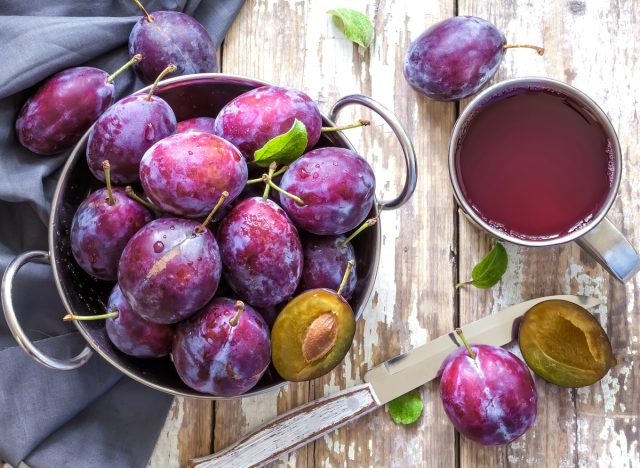
Prune juice is a natural source of many immune-enhancing nutrients, including vitamin C and zinc. Although other juices will offer more bang for your immune-health buck, drinking prune juice will help you meet your quota of some key nutrients that may help keep sickness at bay. Additionally, prune juice can help people maintain proper hydration—another important factor when it comes to immune health.
You can support blood sugar balance.

Fruit juice is oftentimes vilified when people are focused on managing their blood sugars. And while it is true that fruit-flavored "drinks" and balanced blood glucose levels do not go hand-in-hand, opting for 100% prune juice may not be as bad for your blood sugars as you think. Because of the sorbitol found in this juice, the sugars aren't as rapidly absorbed as candy or other options that result in a blood sugar spike once consumed. And with a low glycemic index value of 29, including 100% prune juice in an overall healthy diet can be a reasonable option for those who want managed blood sugars.
You may have a reduced risk of developing hemorrhoids.
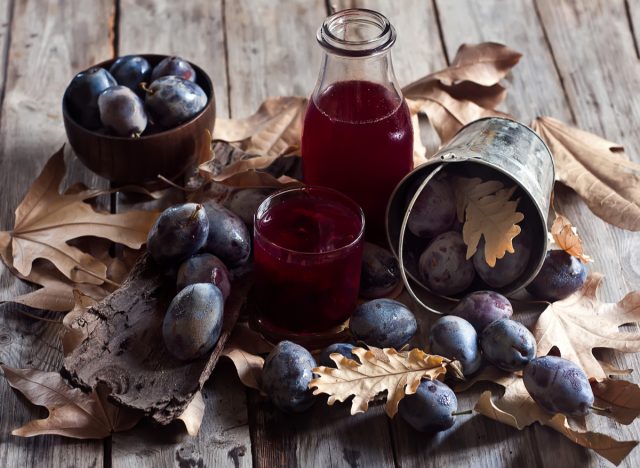
People usually jump on any opportunity to reduce their hemorrhoid risk, as experiencing those pesky swollen veins in the end-points of our digestive tract is something that nobody wants to experience. While there are various causes of hemorrhoids, data shows that some common culprits to increasing one's risk include constipation and prolonged straining in the bathroom. Thanks to the sorbitol found in prune juice that may combat both causes, drinking prune juice may be an effective tool in your hemorrhoid risk-reducing diet.
You may experience cardiovascular benefits.

Between the antioxidants, the potassium, and the soluble fiber that prune juice supplies, it is no wonder why drinking this juice may result in heart health benefits. One study that evaluated pre-hypertensive subjects who either drank prune juice or ate whole prunes found that participants experienced reduced blood pressure. Additionally, a number of studies have shown an association between low potassium intake and increased blood pressure as well as a higher risk of stroke. Since prune juice is a source of potassium, including it as a part of your overall heart-healthy diet can help you meet your potassium quota and help keep your ticker in tip-top shape.

